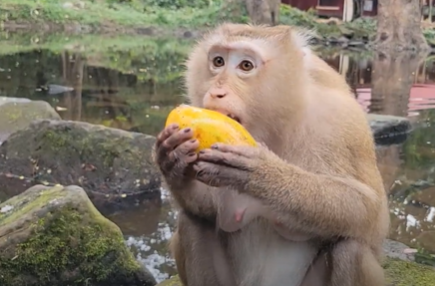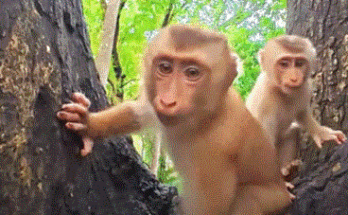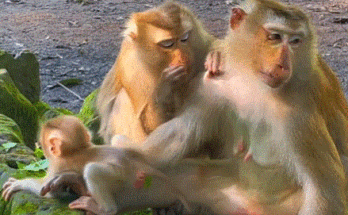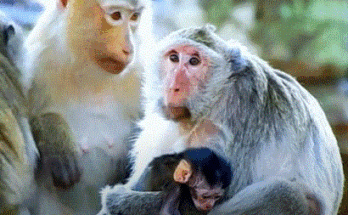The Angkor Wat forest is a place where time seems to stand still. Towering trees create a canopy of soft green light, ancient stones whisper stories of centuries past, and wildlife thrives in its natural rhythm. On a quiet afternoon, I stumbled upon a sight that touched me more deeply than I expected: Rose, a pregnant monkey, enjoying her snack of fresh fruits beneath the shade of the forest.
It wasn’t just about a monkey eating—it was about life, resilience, and the universal language of motherhood.

A Quiet Moment in the Forest
Rose sat gracefully, her rounded belly making her look both delicate and strong at the same time. She reached for fruits scattered on the ground, turning them over gently in her hands before nibbling at them with care. Each bite seemed to carry meaning—not just nourishment for herself, but for the little life growing inside her.
She wasn’t in a hurry. Unlike the younger monkeys who often snatch and play with their food, Rose savored hers. It was almost human-like, the way she closed her eyes for a moment while chewing, as if she was soaking in every bit of peace the forest had to offer.
I found myself holding my breath, not wanting to disturb her serenity.
The Glow of Expectancy
Pregnancy in the wild is never easy. A pregnant monkey like Rose must balance feeding herself, protecting her place in the group, and conserving energy for her unborn child. Yet, in that moment, she radiated calmness.
The sunlight filtered through the canopy, highlighting the soft sheen of her fur. She seemed to glow—not just from the sun, but from the quiet joy of expectancy. Watching her, I thought of human mothers-to-be, finding small comforts in food, rest, and gentle moments of reflection.
It struck me how connected we are. Whether human or animal, the journey of motherhood carries the same emotions: love, vulnerability, and hope.
Lessons From Rose
Rose’s simple act of eating fruit became more than just survival. It was a reminder of the importance of self-care. In a world that moves so quickly, where stress often overshadows joy, here was a mother-to-be teaching me the value of slowing down.
Her snack time wasn’t rushed. It was deliberate, mindful, almost sacred. Each bite seemed like a promise to her unborn baby—that she was doing everything she could to ensure its health and strength.
The Beauty of Angkor Wat’s Wildlife
Angkor Wat is often celebrated for its breathtaking temples and history, but its living treasures are just as remarkable. Families of monkeys roam freely, weaving their lives around the ruins, just as their ancestors have for generations.
Rose is part of this lineage—a living thread in the tapestry of Angkor Wat’s story. Watching her reminded me that beyond the stone carvings and towering spires, life continues in its most raw and beautiful form.
A Universal Story of Motherhood
As I watched Rose nibble gently on a slice of mango, I thought of mothers everywhere—those waiting to welcome their first child, those raising children already, and those who’ve dedicated their lives to nurturing others.
Rose’s moment may have been simple, but it was also profound. She wasn’t thinking of the future in the way humans do, with plans and worries. Yet her every action was instinctively tied to love and protection for her baby. That universal bond is something every parent, every caregiver, can recognize deep in their heart.
Leaving With a Full Heart
When Rose finally finished her snack, she leaned back slightly, resting in the shade. I quietly stepped away, not wanting to intrude on her peace. As I walked through the ancient forest, I carried with me a renewed sense of wonder.
It’s amazing how much one small moment—a monkey eating fruit—can teach us about love, patience, and the beauty of life.
Sometimes, the forest speaks to us not with words, but with the gentle sound of leaves, the soft movements of wildlife, and the quiet presence of beings like Rose.


